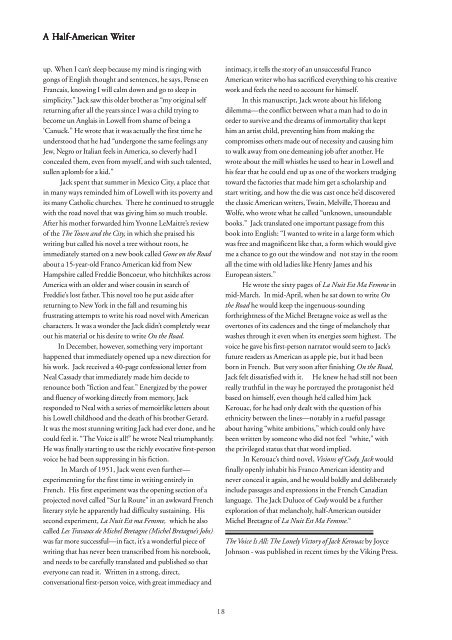Create successful ePaper yourself
Turn your PDF publications into a flip-book with our unique Google optimized e-Paper software.
A Half-American<br />
Writer<br />
up. When I can’t sleep because my mind is ringing with<br />
gongs of English thought and sentences, he says, Pense en<br />
Francais, knowing I will calm down and go to sleep in<br />
simplicity.” Jack saw this older brother as “my original self<br />
returning after all the years since I was a child trying to<br />
become un Anglais in Lowell from shame of being a<br />
‘Canuck.” He wrote that it was actually the first time he<br />
understood that he had “undergone the same feelings any<br />
Jew, Negro or Italian feels in America, so cleverly had I<br />
concealed them, even from myself, and with such talented,<br />
sullen aplomb for a kid.”<br />
Jack spent that summer in Mexico City, a place that<br />
in many ways reminded him of Lowell with its poverty and<br />
its many Catholic churches. There he continued to struggle<br />
with the road novel that was giving him so much trouble.<br />
After his mother forwarded him Yvonne LeMaitre’s review<br />
of the The Town and the City, in which she praised his<br />
writing but called his novel a tree without roots, he<br />
immediately started on a new book called Gone on the Road<br />
about a 15-year-old Franco American kid from New<br />
Hampshire called Freddie Boncoeur, who hitchhikes across<br />
America with an older and wiser cousin in search of<br />
Freddie’s lost father. This novel too he put aside after<br />
returning to New York in the fall and resuming his<br />
frustrating attempts to write his road novel with American<br />
characters. It was a wonder the Jack didn’t completely wear<br />
out his material or his desire to write On the Road.<br />
In December, however, something very important<br />
happened that immediately opened up a new direction for<br />
his work. Jack received a 40-page confessional letter from<br />
Neal Cassady that immediately made him decide to<br />
renounce both “fiction and fear.” Energized by the power<br />
and fluency of working directly from memory, Jack<br />
responded to Neal with a series of memoirlike letters about<br />
his Lowell childhood and the death of his brother Gerard.<br />
It was the most stunning writing Jack had ever done, and he<br />
could feel it. “The Voice is all!” he wrote Neal triumphantly.<br />
He was finally starting to use the richly evocative first-person<br />
voice he had been suppressing in his fiction.<br />
In March of 1951, Jack went even further—<br />
experimenting for the first time in writing entirely in<br />
French. His first experiment was the opening section of a<br />
projected novel called “Sur la Route” in an awkward French<br />
literary style he apparently had difficulty sustaining. His<br />
second experiment, La Nuit Est ma Femme, which he also<br />
called Les Travaux de Michel Bretagne (Michel Bretagne’s Jobs)<br />
was far more successful—in fact, it’s a wonderful piece of<br />
writing that has never been transcribed from his notebook,<br />
and needs to be carefully translated and published so that<br />
everyone can read it. Written in a strong, direct,<br />
conversational first-person voice, with great immediacy and<br />
intimacy, it tells the story of an unsuccessful Franco<br />
American writer who has sacrificed everything to his creative<br />
work and feels the need to account for himself.<br />
In this manuscript, Jack wrote about his lifelong<br />
dilemma—the conflict between what a man had to do in<br />
order to survive and the dreams of immortality that kept<br />
him an artist child, preventing him from making the<br />
compromises others made out of necessity and causing him<br />
to walk away from one demeaning job after another. He<br />
wrote about the mill whistles he used to hear in Lowell and<br />
his fear that he could end up as one of the workers trudging<br />
toward the factories that made him get a scholarship and<br />
start writing, and how the die was cast once he’d discovered<br />
the classic American writers, Twain, Melville, Thoreau and<br />
Wolfe, who wrote what he called “unknown, unsoundable<br />
books.” Jack translated one important passage from this<br />
book into English: “I wanted to write in a large form which<br />
was free and magnificent like that, a form which would give<br />
me a chance to go out the window and not stay in the room<br />
all the time with old ladies like Henry James and his<br />
European sisters.”<br />
He wrote the sixty pages of La Nuit Est Ma Femme in<br />
mid-March. In mid-April, when he sat down to write On<br />
the Road he would keep the ingenuous-sounding<br />
forthrightness of the Michel Bretagne voice as well as the<br />
overtones of its cadences and the tinge of melancholy that<br />
washes through it even when its energies seem highest. The<br />
voice he gave his first-person narrator would seem to Jack’s<br />
future readers as American as apple pie, but it had been<br />
born in French. But very soon after finishing On the Road,<br />
Jack felt dissatisfied with it. He knew he had still not been<br />
really truthful in the way he portrayed the protagonist he’d<br />
based on himself, even though he’d called him Jack<br />
Kerouac, for he had only dealt with the question of his<br />
ethnicity between the lines—notably in a rueful passage<br />
about having “white ambitions,” which could only have<br />
been written by someone who did not feel “white,” with<br />
the privileged status that that word implied.<br />
In Kerouac’s third novel, Visions of Cody, Jack would<br />
finally openly inhabit his Franco American identity and<br />
never conceal it again, and he would boldly and deliberately<br />
include passages and expressions in the French Canadian<br />
language. The Jack Duluoz of Cody would be a further<br />
exploration of that melancholy, half-American outsider<br />
Michel Bretagne of La Nuit Est Ma Femme.“<br />
The Voice Is All: The Lonely Victory of Jack Kerouac by Joyce<br />
Johnson - was published in recent times by the Viking Press.<br />
18





